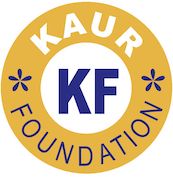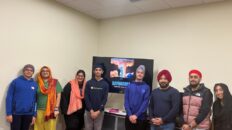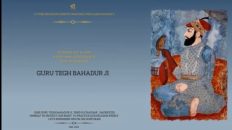By: Riya Mahanta
Even though Sikhism is the fifth-largest religion in the world, it is rarely taught or covered in classroom settings. After seeing the experiences faced by the Sikh Community in America post 9/11, Sikhs realized it was up to them to spread awareness of their Sikh identity and culture. A small group of Sikh parents in Maryland founded Kaur Foundation.

This organization was founded post 9/11 when our Sikh community across the country started to face a lot of backlash because of the mistaken identity people had and ignorance, sheer ignorance, and bias,” said Reshma Singh, president of Kaur Foundation.
Kaur Foundation is a non-profit organization established in 2002 that works with the country’s school systems to bring education about Sikh-Americans into K-12 classrooms through teacher training and through school curriculum materials. They work to promote cultural awareness and inclusiveness for all. Step by step, the Kaur Foundation strives to bring communities together through educational initiatives that encourage dialogue and foster cultural inclusion.
“Kaur Foundation has a mission of creating cultural bridges through education, through K-16 outreach across the country,” Singh said. In our society, especially in schools, bullying, racism, and harmful stereotypes are present. “We see that our Sikh Youth is facing a lot of challenges, despite all the work other Sikh organizations have done to date, so while the average rate of bullying in this country is 25-27%, surveys have shown that Sikh youth get bullied up to 70%,” Singh said.
To help stop these feelings of hatred and fear, it is important to educate our youth to have an understanding and appreciation for other cultures and faiths. Kaur Foundation believes that as our schools and communities grow to be more culturally diverse, it is critical that we appreciate and understand the different backgrounds of our students, neighbors, and colleagues.
“We want to empower our youth to be confident in their skin, and in their very visible external identity, especially when they are in the mainstream communities, specifically schools, colleges, and youth clubs,” Singh said.
On their website, they provide many resources and strategies for educators who want to help with their cause. Some of their tips include: Preventing bullying, social and emotional learning, including Sikh stories, and advocating for religious liberty. More tips, strategies, and resources can be found here.
Another feature they have created is the KF Library (Kaur Foundation Library). This unique digital library is filled with books and stories of Sikhs and the Sikh Identity. They are arranged by age groups, with different books recommended for each age group. There is also a section for parents and teachers as well. Introducing and teaching these books in the classroom is a great way to spread awareness and to educate the youth.
Kaur Foundation also has unique partnerships, one of them being with the National Council for Social Studies. “Kaur Foundation is the only organization where our resources are endorsed by them, so that any social studies teacher in any school district in any part of the country can use our resources,” Singh says.
The Smithsonian Museum also uses resources produced by Kaur Foundation, one being the cultural safari video. The Cultural Safari Video is a resource made for elementary schools as an introduction to Sikhism. It’s been shared all over the world, from Malaysia, to the UK, Australia, Singapore, and many more.
“It’s such a distinct resource, where we talk about Sikhism not as a religion, but from a cultural lense, so it’s very easy for classrooms, libraries, and museums to use to talk and learn about Sikhism,” Singh says. “It’s part of our toolkit of resources.”
Currently, Kaur Foundation is launching a series called Sikh Youth Voices in America. This is a video resource that follows the journeys of Sikh Youths in America. It contains interviews from Sikhs ranging from 15-30 years old. These Sikhs share their experiences, challenges, and how Sikhi has empowered them to be who they are today. Across the interviewees, many fundamental concepts of Sikhi are covered like langar, gender equality, and Chardikala.
For more information about the organization, go to their website Kaurfoundation.org.















